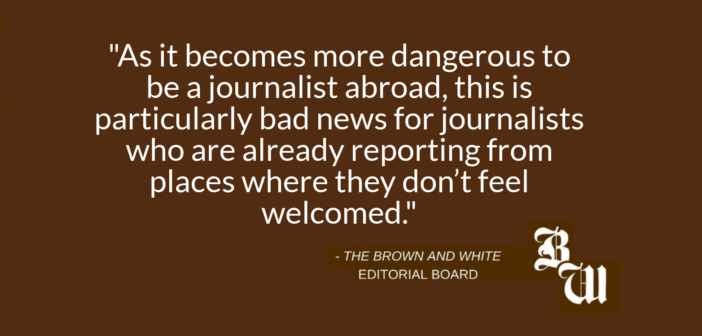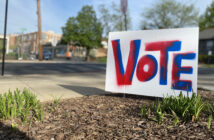Jamal Khashoggi went into the Saudi consulate in Turkey on Oct. 3 and never returned. Turkish police found evidence that The Washington Post columnist was killed in the consulate, though this claim was refuted by President Trump and Saudi King Salman.
According to the Committee to Protect Journalists, 1,323 journalists have been killed globally since 1992. In the 12-year period from 1992 to 2004, 514 journalists were killed. In the same interval from 2006 to 2018, the number is up to 759.
It is becoming increasingly dangerous to be a journalist on a global stage. Those numbers are far higher than they should be. In the U.S., there have been 11 journalist deaths since 1992. While this number is lower than that of other nations, our treatment of the press is imperfect in ways that don’t always involve violence.
The U.S. is ranked 45 out of 180 countries in the Reporters Without Borders most recent World Press Freedom Index, which is below all other Western superpowers. Despite a surprisingly low ranking, journalists in the U.S. are relatively safe, unlike those in other nations where reporting on controversial topics can result in death.
In the U.S., journalists may be ridiculed or lose respect. The ‘fake news’ era under President Trump has played a role in the decreasing appreciation for journalists not only in the U.S. but around the world. Examples range from Malaysia’s Fake News Act to Libyan media dubbing a CNN report on slavery as fake news and a Chinese military website aimed at collecting reports of fake news.
Some countries may already have a crippling relationship between the press and the state. As it becomes more dangerous to be a journalist abroad, this is particularly bad news for journalists who are already reporting from places where they don’t feel welcomed.
Discouraging journalism is one of the most dangerous ways to become disconnected from those in power. Without journalists, we would be kept in the dark from important social and political matters. As the amount of killings increases and press freedom comes under fire, going into journalism as a career is certainly less inviting.
The role of the press is crucial, not just in a functioning democracy like we have in the U.S., but around the world. Journalists must hold those in power accountable for wrongdoings, report on conflict and atrocity and make certain that critical issues and stories receive acknowledgment on a global scale.
The press speeds up social change and exposes situations that may otherwise be hidden from the public eye. Without the press, we are all kept in the dark from many topics of discussion, ranging from sports and health to breaking news and movie reviews.
Many countries around the world have state-run media outlets and do not enjoy the right to a free press like we do in the U.S. It is time we recognize and appreciate our independent press. It serves as a watchdog on power and a voice to the voiceless, and we should feel thankful that we have complete, uncensored access to information.
Would the Watergate scandal have taken place without journalists? How about The Boston Globe‘s exposure of Church abuse? Or Ronan Farrow of The New Yorker alleging Les Moonves of sexual misconduct? Without journalists, none of these wrongdoings would have been presented in the public eye.
Let’s remember that. And remember that movements for years to come will depend on the safety and freedom of journalists.
But oddly enough, as it becomes more dangerous to be a journalist, the concept of reporting has become more popular as our access to the Internet grows.
In today’s world, everyone has smartphones and is on social media, so we all have access to platforms to spread information.
The increase of technology in our daily lives and our social networking abilities can be a good thing as the spread of information becomes almost instantaneous. This is particularly useful in urgent and deadly scenarios like natural disasters or in conflict zones where notifying the public can save lives.
It is a double-edged sword, however, because there is no way to prevent the spread of fake news and biased information.
The lines for journalism have been blurred, and many people who refer to themselves as journalists show a lack of training or caution. The rise of citizen journalism has contributed to people pointing fingers at the press, claiming them to be spreading untrustworthy information.
With appreciation for the press must also come a willingness to develop media literacy, not only for professional journalists, but also for the general public.






Comment policy
Comments posted to The Brown and White website are reviewed by a moderator before being approved. Incendiary speech or harassing language, including comments targeted at individuals, may be deemed unacceptable and not published. Spam and other soliciting will also be declined.
The Brown and White also reserves the right to not publish entirely anonymous comments.